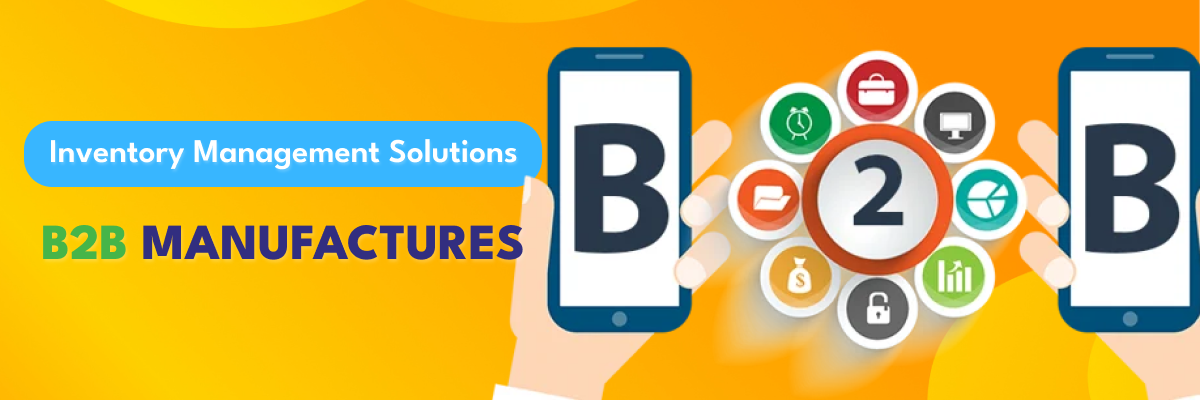
Inventory Management Solutions for B2B Manufacturers: What You Need to Know
In today’s competitive business environment, effective inventory management is crucial for success, especially for B2B manufacturers. Managing inventory efficiently can significantly impact your company’s profitability, customer satisfaction, and overall operational efficiency. But how does inventory management differ between B2B and B2C companies? And what solutions can B2B manufacturers implement to streamline their processes and stay ahead of the competition? Let’s explore these questions and discover how Rupyz’s software can revolutionize inventory
What Are B2B and B2C Companies?
Before diving into inventory management, it’s essential to understand the distinction between B2B and B2C companies.
What Is a B2B Company?
Business-to-Business (B2B) companies engage in commercial transactions with other businesses. In simple terms, B2B companies provide products or services to other companies, which in turn use these resources to operate or enhance their own businesses. For example, a company that manufactures machinery for other businesses to use in production is a B2B company. B2B companies often deal with large transactions, long-term contracts, and a smaller customer base compared to B2C companies.
There are two types of B2B companies:
- Vertical B2B: These companies operate within a specific industry. For instance, a steel manufacturer that sells exclusively to construction firms.
- Horizontal B2B: These companies cater to multiple industries. For example, a software company that provides accounting software to businesses across various sectors.
What Is a B2C Company?
Business-to-Consumer (B2C) companies, on the other hand, engage in commercial transactions directly with individual consumers. B2C companies create value by selling products or services that consumers purchase for personal use. Examples include retail stores, online marketplaces, and service providers like gyms or hair salons.
B2C companies can be categorized into two types:
- Product-focused B2C: These companies provide tangible goods, like electronics, clothing, or food.
- Service-focused B2C: These companies offer services such as entertainment, healthcare, or education.
Inventory Management for B2B and B2C Companies
Inventory management is the process of ordering, storing, and using a company’s inventory, which includes raw materials, components, and finished products. While inventory management is vital for both B2B and B2C companies, the approach and challenges differ significantly between the two.
Inventory Management in B2B Companies
B2B companies often deal with large volumes of high-value products, making inventory management a complex and critical process. Key challenges in B2B inventory management include:
- Handling Large Orders: B2B companies frequently receive bulk orders that need to be fulfilled quickly and accurately. Managing these orders requires robust inventory systems to track stock levels and ensure timely delivery.
- Maintaining High-Value Inventory: B2B companies often manage expensive inventory that requires careful monitoring to avoid losses due to overstocking or stockouts.
- Processing Repeated Orders: B2B companies typically have long-term relationships with their customers, leading to repeated orders. Efficient inventory management ensures that these recurring orders are processed smoothly, maintaining customer satisfaction.
- Manual Processing: Despite the availability of digital tools, many B2B companies still rely on manual order processing. This method can lead to errors, delays, and poor customer service.
Inventory Management in B2C Companies
B2C inventory management focuses on handling a high volume of transactions with smaller order sizes. Key challenges include:
- Rapid Turnover: B2C companies must manage fast-moving inventory to meet consumer demand and avoid stockouts.
- High Customer Expectations: Consumers expect quick deliveries and accurate order fulfillment, requiring efficient inventory management systems.
- Varied Product Range: B2C companies often deal with a wide range of products, necessitating sophisticated inventory tracking and management solutions.
Inventory Management Challenges in B2B vs. B2C
Whether a business operates in a B2B or B2C environment, effective inventory management is essential to maintaining profitability and customer satisfaction. However, the challenges faced by B2B companies are often more complex due to the nature of their transactions.
Some common inventory management challenges for B2B companies include:
- Fulfilling Large Orders Quickly and Reliably: B2B companies must ensure that large orders are fulfilled accurately and on time. Delays or errors in order fulfillment can lead to customer dissatisfaction and lost business.
- Handling a High Number of Buyers: B2B companies often deal with multiple decision-makers within their clients’ organizations. Coordinating with various stakeholders can be challenging and requires efficient communication and order management systems.
- Managing Large-Scale Bulk Orders: B2B companies often handle bulk orders that require precise inventory management to avoid issues like overstocking or stockouts.
- Addressing the Perception of Risk: B2B companies must manage the perception of risk by demonstrating reliability and efficiency. Implementing inventory management software can help companies showcase their ability to track and manage stock, orders, and sales effectively.
How Rupyz’s Software Can Help Manage B2B Inventory
Rupyz offers a comprehensive inventory management solution tailored to the unique needs of B2B manufacturers. Here’s how Rupyz’s software can transform your inventory management process:
1. Real-Time Inventory Tracking
Rupyz’s software provides real-time visibility into your inventory levels, ensuring that you always know what stock is available. This feature helps prevent overstocking and stockouts, allowing you to fulfill orders accurately and on time.
2. Automated Order Processing
By automating the order processing workflow, Rupyz eliminates the need for manual data entry and reduces the risk of errors. This automation streamlines the entire process, from order receipt to fulfillment, improving efficiency and customer satisfaction.
3. Advanced Analytics and Reporting
Rupyz’s software offers advanced analytics and reporting tools that provide insights into your inventory performance. With detailed reports on sales trends, order patterns, and stock levels, you can make informed decisions that optimize your inventory management and drive business growth.
4. Integration with Existing Systems
Rupyz seamlessly integrates with your existing ERP and CRM systems, ensuring a smooth flow of data across your organization. This integration helps break down silos and fosters collaboration between departments, leading to more efficient inventory management.
5. Scalability and Flexibility
As your business grows, Rupyz’s cloud-based software scales with you. Whether you’re expanding your product line or entering new markets, Rupyz provides the flexibility you need to adapt and thrive.
6. Enhanced Communication and Collaboration
Rupyz’s platform includes tools for improved communication with suppliers, customers, and internal teams. This feature ensures that everyone involved in the inventory management process is on the same page, reducing the risk of misunderstandings and errors.
Conclusion
Effective inventory management is critical for B2B manufacturers looking to maintain a competitive edge. By addressing the unique challenges of B2B inventory management—such as handling large orders, maintaining high-value inventory, and managing manual processes—Rupyz’s software offers a comprehensive solution that enhances efficiency, reduces risk, and improves customer satisfaction.
Don’t let outdated inventory management practices hold your business back. With Rupyz’s innovative software, you can streamline your operations, gain valuable insights, and position your company for long-term success in the B2B marketplace. Partner with Rupyz today and take the first step toward a more efficient and profitable future.
Transform your B2B Business
We would love to give a comprehensive walk through of our system & demonstrate how we can contribute to your growth story.
Book A Demo

